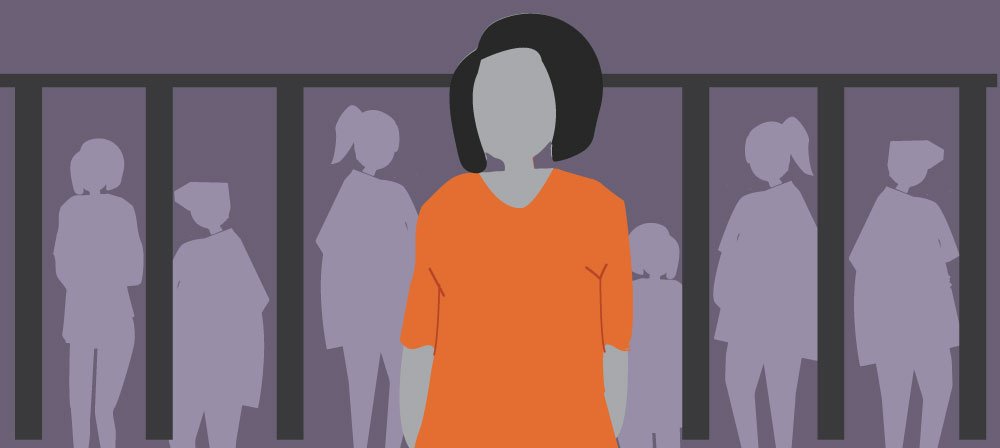The ABC of hep C
Hepatitis means 'inflammation of the liver'. The liver is a vital organ — it does over 500 things, including detoxing the body of the poisons in medications, pollution and processed foods; storing iron and other vitamins; storing energy from food and releasing it when you need it; and defending against germs like flus and colds.
Carla’s story: I beat hep C and now I’m helping others
Carla is a peer worker at a Needle and Syringe Program and in the hep C testing and treatment space. She tells how she uses her lived experience helps her help others to access the health care they need.
Using in jail and hep C
Interview with 3 people with lived experience of incarceration who gave us the lowdown on the risk of hep C in jail and how it is best avoided.
“The Time is Now”: New Tasmanian drug user network launches declaration
On 26 September, more than 60 people around the country attended an online event that launched the foundational declaration of Tasmanians with Substance, a collective of people with lived and living experience of using alcohol and other drugs in lutruwita/Tasmania.
When groin injection goes wrong
“Your infection markers are through the roof ... Ultrasound found an aneurysm the size of a golf ball in your femoral artery. We’ll need to do surgery and I’ll be honest with you: it’s a high-risk procedure.” My mind flitted back to the evening I think it started when my hands were shaking so much from my medication regimen that I hit my artery. Of course, I was so impatient to get my fix in me that I didn’t bother with swabs. Bad mistake.
Magic mushrooms for meth?
There is an ongoing clinical trial of giving psilocybin (the active ingredient in ‘magic mushrooms’) to help people who are living with a methamphetamine (‘meth’ or ‘ice’) use disorder. Maureen Steele is a Peer Worker who helped design the trial to ensure it gives users what they need to succeed.
What’s the latest on stimulant replacement treatment?
Many people who are dependent on illicit opioids (such as heroin) have benefited from the Opioid Treatment Program (OTP), which allows them to be prescribed a ‘substitute’ opioid such as methadone or buprenorphine. A replacement program like that for people who use stimulants (such as methamphetamine) doesn’t exist. However, some promising research into possible stimulant replacement treatment is happening.
Підтримка, а не покарання / Support. Don't Punish
This video was produced by Ukrainian drug user organisation VOLNa, for Support Don’t Punish Day 2023. They say: “Every year on June 26, on the day of the Support, Don’t Punish campaign, the All-Ukrainian Association of People with Drug Addiction “VOLNa” throughout Ukraine expresses its protest against the cruel and senseless state policy regarding drugs and people who use drugs. This year is no exception. The war is going on, all the people of Ukraine have united to fight back against the vicious and dangerous enemy - Russia. And when the unification of the people takes place, it is important to remember all the citizens of the country.”
Changes to the OTP in 2023
On May 10, the Commonwealth Government announced additional funding for, and changes to, the Opioid Dependence Treatment Program (ODTP). Read about them here.
Hate this
“Can’t get angry though, because one angry blackfella means we’re all angry blackfellas. Yet a handful of incompetent whitefellas means what? The system. I want you to care. I want you to be angry, too. I want you to hate this.”
Hate This, is a powerful piece written by Carissa Lee, a Noongar actor and writer whose work has featured in The Guardian, Junkee, Witness Performance, IndigenousX and The Conversation. We are happy to be able share the piece both as written text and spoken word performed by First Nations actor Angeline Penrith.
Shining a Light on the Hope-Filled, Stressful Journeys of People Leaving Jail
Exhaustion is a one-women radio play about life after jail. Jarrah, a woman in her 40s, gives the audience a massive dose of ‘real talk’, offering her vulnerability and her struggles to overcome the challenges of life after release from jail. She inspires empathy and concern as she shares the things that are important to her and how she feels.
What’s Happening with Medicinal Cannabis?
Dr Karen Hitchcock is one of Australia’s first authorised prescribers of medicinal cannabis and a supporter of its benefits. She recently spoke at the “Garden States” conference, run by Entheogenesis Australis (EGA), where she outlined how the medicinal cannabis world has changed over the last 4 years. She busted some old myths like “If you don’t have multiple sclerosis (MS) or epilepsy, you can't get prescribed cannabis”, “Only a few doctors in Australia can prescribe”, “There’s only a couple of cannabis oils that can be prescribed.” The following is based on her informative and insightful responses at a Q&A at the conference.
More than 600 people tested for hep C by Peers on Wheels
In late March, the Peers on Wheels (POW) project carried out its 600th Point of Care Test (POCT) for the hep C virus. The POW project is an ongoing 1-year pilot scheme by NUAA — in partnership with The Kirby Institute, NSW Health, and selected Local Health Districts — to bring hep C testing and treatment to people who inject drugs, wherever they are in NSW.
Aunty Libby says: “Get tested! Get treated!”
Hep C isn’t nice. It makes you feel permanently sick and run down. There are reasons, however, why people might be reluctant about getting treated. Before 2016, the main treatment was Interferon. As Aunt Libby — an Aboriginal elder and grandmother of 13 (soon to be 14) — explains, that treatment could feel worse than the illness it was curing. The good news is that the new treatment (a box of pills called “Direct Acting Antivirals” or DAAs) is much easier: fewer pills, no injections and much fewer side effects. Furthermore, they are free or cheap, and if you get reinfected you can do the treatment again — as many times as you need to. Aunt Libby has had both hep C treatments. In this article she compares the 2 and says, “I’d recommend this treatment to anyone. But Interferon, they can forget about that one!”
Tripping over ourselves to get free
“LSD, MDMA, ketamine, ibogaine: for years I tried any potentially therapeutic substance I could get my hands on. I found my way to empty rooms in quiet places and would take these drugs while listening to music, hoping to find a path to peace.” Al talks about his own experiments with psychedelics, shares insights about how psychedelics have given him a tool, but not the answer, for dealing with mental health issues and speculates over whether psychedelics may be useful in increasing the well-being of society as a whole.
Golden staph: It’s there and it’s on you! | Sally’s Story
Golden staph is a nasty bug and surprisingly common — 8 out of 10 people have it on their skin. If you don’t swab, you can inject it into your bloodstream, and, as Sally explains, it’s not something you want in your bloodstream! So swab!
NSW State Election 2023: where do the parties stand?
How do NSW Parties score on important drug policy reform in NSW? The NSW Users and Aids Association asked registered parties for the upcoming NSW Election a series of questions to understand how their party scores on important issues in NSW Drug Policy Reform. See the scorecard to find out.
POW! Breaking barriers to hep C care in the Suburbs
Through the Peers on Wheels (POW) project, NUAA has partnered with The Kirby Institute, NSW Health, and selected Local Health Districts, to work towards eliminating hep C through outreach, testing and offering treatment options. At the heart of the project is a van, with a Point of Care Testing (POCT) machine and a skilled peer workforce. The aim is to remove barriers to hep C treatment among people who inject drugs by going to where people live and providing the service without stigma. The POW team has visited various regional cities and towns and rural communities around NSW, but Users News caught up with them in Riverwood in the suburbs of Sydney.




















